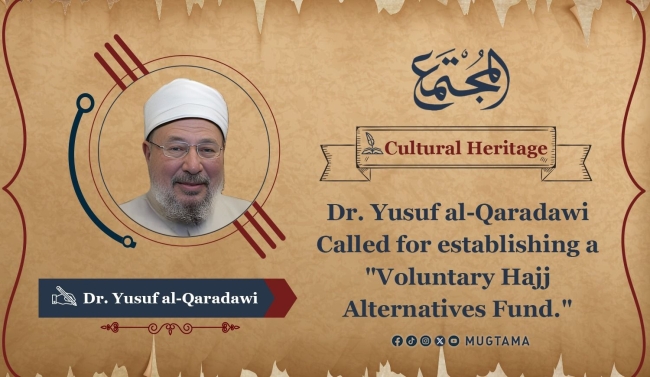Dr. Yusuf al-Qaradawi Called for establishing a “Voluntary Hajj Alternatives Fund”
- "A close relative of ours is getting ready to perform the Hajj for the fifth time this year, despite the presence of poverty and deprivation in our city. I've attempted to convince them that there are priorities in our faith, but to no avail. Is there a message you could direct to them?"
Indeed, no scholar doubts the knowledge of Islamic priorities and the distinction between what deserves precedence and what can be deferred among the obligations that must be considered. This is what I have advocated for years, calling it the "Jurisprudence of Priorities". We must understand that Islam, in its obligations, is not on a single level; there are levels of deeds. The Prophet, peace be upon him, said: "Iman has over seventy branches, the uppermost of which is the declaration: 'None has the right to be worshipped but Allah'; and the least of which is the removal of harmful object from the road."
So, there are higher, lower, and intermediate matters, as Allah says: "Have you made the providing of water for the pilgrim and the maintenance of al-Masjid al-Haram equal to [the deeds of] one who believes in Allah and the Last Day and strives in the cause of Allah? They are not equal in the sight of Allah." (Quran, 9:19)
Things are not equal, and we want to educate Muslims on this jurisprudence. I have long observed people who oppress workers under their employ, while farmers in my village work for landowners or tenants, their lands neglected, yet they do not forgive them a single penny. Then they come to perform Hajj for the third or tenth time. If these individuals were to give these workers their due rights, it would be better than repeating Hajj.
The scholars have said, "Allah does not accept the optional acts of worship until the obligatory ones are fulfilled." Thus, one who prioritizes the obligatory over the optional is excused, but one who prioritizes the optional over the obligatory is deluded. Therefore, we are in need of understanding this jurisprudence.
The Jurisprudence of the Companions and Followers
It is narrated from Abdullah ibn Masood (may Allah be pleased with him) that he said: "In the last days, people will frequently perform Hajj without reason. Travel will be made easy for them, and their wealth will be increased. One will ride his camel through the sands and deserts to perform Hajj, while his neighbour, who is in need, receives no help from him."
He points out that while someone may go to perform Hajj, traveling through sands and deserts, his neighbour is imprisoned by hunger, poverty, or need, and he does not assist him.
A man once came to Bishr bin al-Harith, one of the ascetics and devout scholars of the Ummah, and said to him: "O Abu Nasr, I intend to perform Hajj, and I came to seek your advice. Do you have any counsel for me?" Bishr asked him, "How much have you prepared for the expenses of Hajj?" The man replied, "Two thousand dirhams," which was a substantial amount at that time with significant purchasing power. Bishr then asked, "Do you want to perform Hajj out of asceticism, longing for the House, or seeking the pleasure of Allah?" The man replied, "By Allah, I seek the pleasure of Allah." Bishr then said, "Shall I guide you to something that will fulfill the pleasure of Allah while you are in your town and home? If I tell you, will you do it?" The man said, "Yes, I will." Bishr then said, "Go and give this amount to ten people: a poor person to alleviate their poverty, an orphan to fulfill their need, a debtor to pay off their debt, and a person supporting a family to lighten their burdens." He listed ten such people and added, "Even if you give it all to one person to fulfill their need, it is better; meaning, it will suffice them and solve their problem with these two thousand dirhams." The man then said, "O Abu Nasr, my heart is set on the journey." Bishr responded, "If the money is collected from the dirt of trades and doubts, the soul insists on spending it on its desires."
Personally, I believe it shows a lack of understanding to repeat Hajj without reason and to neglect priorities. It is more important for a Muslim to realize that feeding the hungry, treating the sick, sheltering the homeless, supporting orphans, meeting the needs of widows, building a school or a mosque for an Islamic community in Asia or Africa, or contributing to a significant project, are all better in the sight of Allah.
A Muslim should feel spiritual joy and satisfaction from these noble deeds more than from repeating Hajj, going around the Kaaba, and saying, "Here I am, O Allah, here I am." This clearly indicates a deficiency in understanding and prioritizing religious duties.
If Muslims understood this, we could benefit from billions every year. If these billions were organized and managed by an entity with a fund called the "Voluntary Hajj Alternatives Fund," for those seeking greater rewards than from voluntary Hajj, the brothers who decide not to repeat Hajj could contribute their Hajj expenses to this fund for the benefit of Muslims worldwide. These amounts could then address significant needs in the lives of Muslims. I hope this awareness spreads in the Ummah.
-------------------------------------------------------------
(Issue No. 1585, p. 57 – 25 Dhu al-Qi'dah 1424 AH – 17/01/2004 AD)







